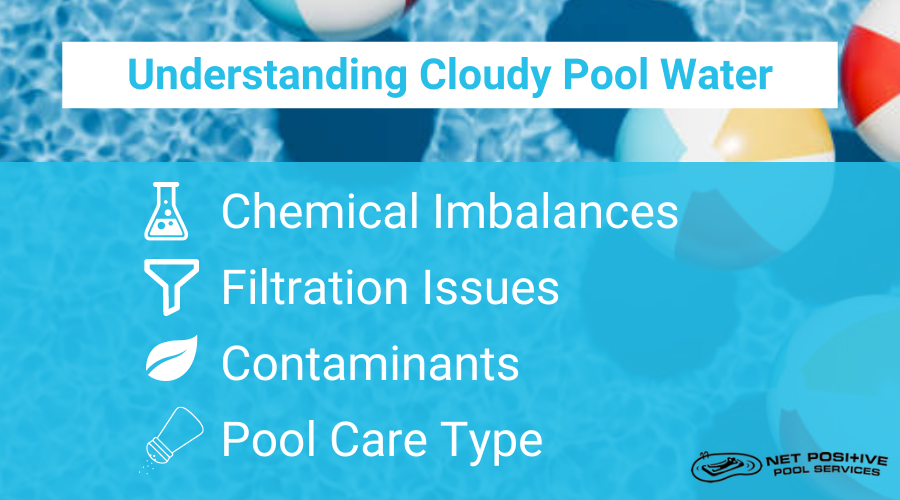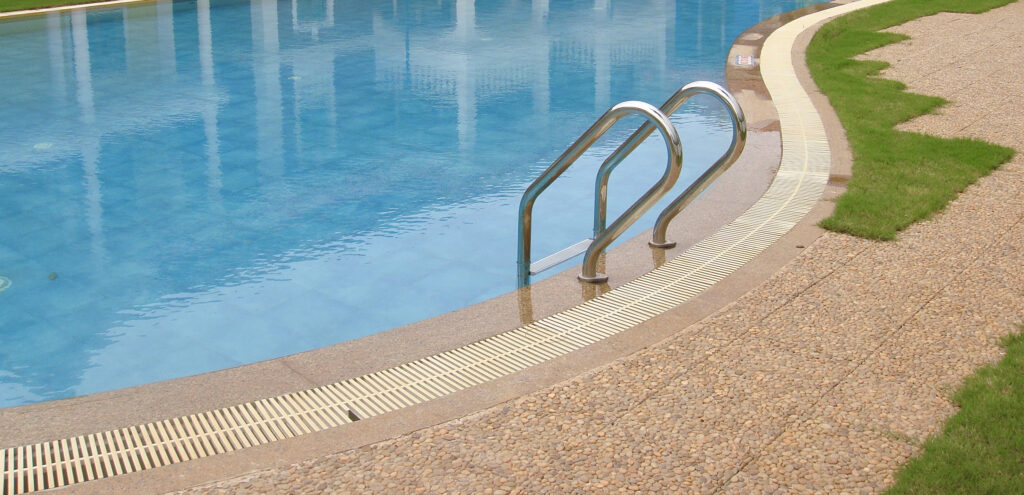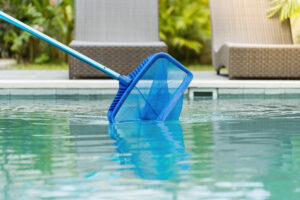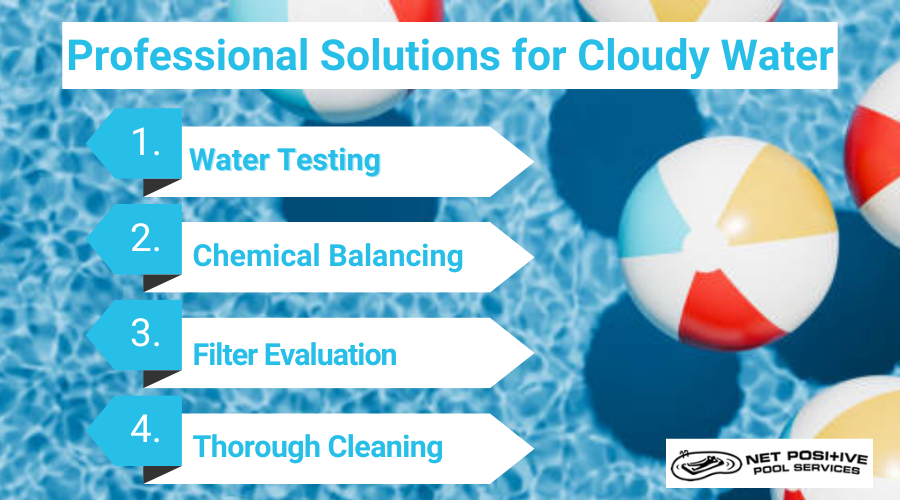Table of Contents
A pristine pool is the centerpiece of summer enjoyment, but if your pool water is looking cloudy, it can quickly turn an inviting swim into a disappointing experience. Cloudy pool water is a common issue and can stem from a range of problems. Understanding these causes and knowing how professional pool services can help is essential for maintaining a clear and enjoyable swimming pool. In this comprehensive guide, we will explore the factors behind cloudy pool water, professional solutions to address the issue, and preventive measures to keep your pool in top condition.

Understanding Cloudy Pool Water
Cloudy pool water is often more than just an aesthetic problem. It indicates underlying issues that can affect water quality and swimmer safety. Several factors can contribute to cloudiness, each requiring different approaches to fix the issue.
Chemical Imbalances
One of the most common causes of cloudy pool water is imbalanced pool chemistry. A swimming pool requires a precise balance of pool chemicals to maintain clarity and ensure safety. Here’s a closer look at how chemical imbalances can cause cloudiness:
- Chlorine Levels: Chlorine is essential for sanitizing pool water by killing bacteria and algae. Low chlorine levels can lead to ineffective disinfection, allowing contaminants to proliferate and cloud the water. Conversely, excessive chlorine can also cause cloudiness and irritation.
- pH Levels: The pH level of pool water measures its acidity or alkalinity. Ideal pH levels range from 7.2 to 7.6. When the pH is too high or too low, it can affect chlorine’s effectiveness. High pH levels can cause chlorine to form chloramines, which contribute to cloudy water, while low pH levels can lead to corrosion and other issues.
- Total Alkalinity: Total alkalinity helps stabilize pH levels. If alkalinity is too high, it can cause the water to become cloudy and lead to scale formation. Low alkalinity, on the other hand, can result in pH fluctuations and contribute to cloudy water.
- Calcium Hardness: Calcium hardness refers to the concentration of calcium in the water. High calcium hardness can lead to cloudy water and scale formation, while low levels can cause corrosion and other problems.
Filtration System Issues
The filtration system is crucial for maintaining clear pool water. If your filter is not functioning correctly, it can lead to poor water clarity. Key issues to consider include:
- Filter Type and Condition: Pools typically use sand, cartridge, or diatomaceous earth (DE) filters. Each type of pool filter requires regular maintenance to function effectively. Sand filters need periodic backwashing, cartridge filters need cleaning or replacement, and DE filters require replenishment of DE powder. A malfunctioning filter or clogged filter media can result in cloudy water.
- Filter Runtime: The filter should run long enough each day to circulate and filter all of the water in the pool. Inadequate runtime can result in insufficient filtration and contribute to cloudiness.
Debris and Organic Contaminants
Debris and organic contaminants can cloud pool water quickly. Common sources include:
- Leaves and Debris: Falling leaves, twigs, and other debris can accumulate in the pool and cause cloudiness. Even small amounts can affect water clarity.
- Algae Growth: Algae can grow in pools with imbalanced chemistry or insufficient sanitation. Algae spores can make the water look green or cloudy, depending on the type and severity of the bloom.
- Organic Contaminants: Sweat, oils, and other organic materials from swimmers can also contribute to cloudiness. If these contaminants can react with enough chlorine, it will form chloramines that cause murkiness.
Pool Type Considerations
Different types of pools require different care and treatment:
- Chlorine Pools: Traditional chlorine pools need regular testing and adjustment of chlorine and pH levels. They are typically more straightforward to maintain compared to other types.
- Saltwater Pools: Saltwater pools use a salt chlorine generator to produce chlorine. While they generally require less maintenance, they still need careful monitoring of salt levels and other chemical balances. Imbalances in a saltwater pool can also lead to cloudiness.
Professional Solutions for Cloudy Pool Water
Addressing cloudy pool water effectively often requires professional intervention. Here’s how experts can help:
Comprehensive Water Testing
As a first step, professional pool technicians use advanced testing equipment to analyze water chemistry. This thorough testing includes measuring chlorine levels, pH, alkalinity, and calcium hardness. Accurate results allow for precise adjustments to restore water clarity. Professionals can also identify specific issues, such as high or low levels of contaminants, and recommend targeted solutions.
Chemical Balancing and Adjustment
Once the water has been tested, professionals will adjust the chemical levels as needed. This may involve:
- Adjusting Chlorine Levels: Adding the appropriate amount of chlorine to ensure effective sanitation and clarity.
- Balancing pH and Alkalinity: Correcting pH and alkalinity levels to stabilize the water and improve chlorine effectiveness.
- Managing Calcium Hardness: Adjusting calcium hardness levels to prevent scale formation or corrosion.
Filtration System Evaluation and Maintenance
Professionals will assess the condition and performance of your filtration system. This includes:
- Inspecting and Cleaning Filters: Ensuring that sand, cartridge, or DE filters are clean and functioning properly.
- Checking Filter Operation: Verifying that the filter is running for the correct amount of time each day and making any necessary adjustments.
- Recommending Upgrades: If the poor filtration system is outdated or underperforming, professionals may suggest upgrades or replacements to improve filtration efficiency.
Thorough Pool Cleaning
Professionals will assess the condition and performance of your filtration system. This includes:
- Removing Debris: Using skimmer baskets and vacuums to remove leaves, twigs, and other debris from the pool.
- Cleaning Pool Surfaces: Brushing the pool walls and floor to remove algae and other contaminants.
- Shocking the Pool: Applying a shock treatment to break down organic materials and enhance chlorine effectiveness.
- Using a Pool Clarifier: Adding a water clarifier to bind small particles and improve filtration.

Preventive Measures to Keep Your Pool Clear
Regular maintenance and preventive measures can help avoid cloudy pool water. Consider the following practices:
Routine Chemical Testing
Regular testing of pool water is crucial for maintaining balanced chemistry. Use test kits or test strips to monitor chlorine levels, pH, alkalinity, and calcium hardness. Regular checks allow for timely adjustments and prevent imbalances that can lead to cloudiness.
Seasonal Maintenance
Proper preparation for the swimming season includes:
- Spring Cleaning: Before the season begins, perform a thorough cleaning of the pool, including removing debris, checking and adjusting chemical levels, and inspecting the filtration system.
- Fall Preparation: As the swimming season ends, prepare your pool for winter by cleaning it thoroughly and adjusting chemical levels to prevent damage.
Pump and Filter Management
Ensure your pool’s pump and filter system are functioning efficiently:
- Daily Operation: Run the pump and filter for the recommended amount of time each day to ensure effective filtration.
- Regular Maintenance: Clean or replace filter components as needed and keep the pump in good working condition.
Ongoing Professional Support
Engage with a professional pool service provider for expert advice and support. Regular maintenance and inspections by professionals can help prevent issues and ensure your pool remains clear and inviting.

Contact Net Positive Pools Today
Cloudy pool water can be a frustrating problem, but understanding its causes and how professionals can help makes it manageable. By addressing chemical imbalances, maintaining your pool filter system, and keeping your pool clean, you can ensure clear and enjoyable water. If you’re struggling with persistent cloudiness or simply lack the time for thorough maintenance, Net Positive Pools is here to assist. Our team of experts is dedicated to providing comprehensive pool care solutions, ensuring your pool remains pristine and ready for every swim.
For professional pool maintenance and support, contact Net Positive Pools. Let us help you achieve and maintain crystal clear water, so you can get the most out of your pool.



